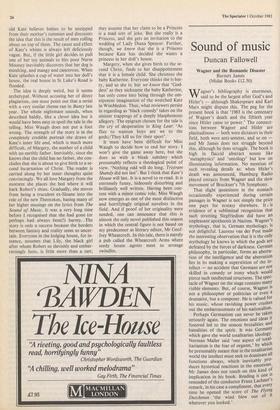Sound of music
Duncan Fallowell
Wagner and the Romantic Disaster Burnett James (Midas Books £12.50)
Wagner's bibliography is enormous, said to be the largest after God's and Hitler's — although Shakespeare and Karl Marx might dispute this. The peg for the present book is that '1983 is the centenary of Wagner's death and the fiftieth year since Hitler came to power.' The connect- ions between Wagner and Hitler are platitudinous — both were dictators in their field, both were anti-semites, and so on and Mr James does not struggle beyond this, although he does struggle. The book is high in flaccid abstract nouns like 'metaphysics' and 'ontology' but low on illuminating information. No mention of such revealing details as: when Hitler's death was announced, Hamburg Radio played extracts from Wagner and the slow movement of Bruckner's 7th Symphony.
That slight queasiness in the stomach occasionally experienced during certain passages in Wagner is not simply the price one pays for ecstasy elsewhere. It i$ evidence of a subliminal recognition that such strutting Siegfriedism did have an unpleasant apotheosis in Nazism. Wagner's mythology, that is, German mythology, is not delightful. Laurens van der Post made the interesting observation that it is the only mythology he knows in which the gods are defeated by the forces of darkness. German philosophy, in particular, forms an aberra- tion of the intelligence and the aberration lies in its making a superstition of the in- tellect — no accident that Germans are not skilled in comedy or irony which would pierce such intellectual structures. The spec- tacle of Wagner on the stage contains many risible elements. But, of course, Wagner Is not a philosopher or politician or even a dramatist, but a composer. He is valued for his music, whose ravishing power crushes out the embarrassments of his nationalism. Perhaps Germanism can never be taken seriously again. The emotions and ideas it fostered led to the utmost brutalities and banalities of the spirit. It was GermanY which gave the world totalitarian ideology.
Norman Mailer said 'one aspect of total-
itarianism is the fear of orgasm,' by which he presumably meant that in the totalitarian
world the intellect must seek to dominate all functions always, which inevitably pro- duces hysterical reactions in the emotions. Mr James does not touch on this kind of
implication in his book. Reading it one is reminded of the conductor Franz Lachner s
remark, in his case a compliment, that every time he opened the score of The Flying Dutchman 'the wind blew out of it wherever you looked.'






































 Previous page
Previous page